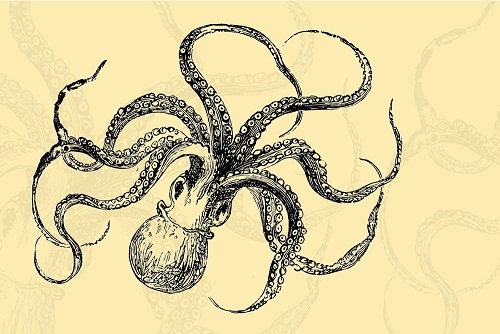
FAYETTEVILLE, Ark. – Is your cat capable of jealousy? Do octopuses feel fear? Can birds practice deception? Ed Minar, professor and chair of the Department of Philosophy in the J. William Fulbright College of Arts and Sciences, will discuss these and other mysteries in his preview lecture for his fall 2020 Honors College Signature Seminar titled “Animal Minds.”
The lecture is scheduled to take place at 5:15 p.m. Wednesday, Feb. 19, in Gearhart Hall Auditorium (GEAR 026) and will explore the ways feelings are assigned to animal counterparts and how humans can better understand animal consciousness and themselves.
As a philosopher, dog trainer and roommate to three Australian shepherds, Minar has had decades of experience in understanding animal – or at least canine – thinking and behavior.
“Thinking about animals is interesting and beneficial to us as humans,” Minar said. “If we know how animals communicate, it can give us a different idea of how we communicate and help us understand ourselves.”
That understanding is a key element of his fall 2020 course, which will examine the complexities of relationships between humans and animals. Students will also explore – and challenge – centuries of philosophical thinking pertaining to animal consciousness.
“A lot of our treatment of animals is out of mind, because out of sight,” said Minar, citing the incompatibility of the bacon we put on our plates with our own moral understanding of the often-inhumane treatment of pigs on factory farms and in slaughterhouses. “It becomes much easier to divorce animals from their needs, thoughts, and suffering when we aren’t in direct contact with them.”
 Photo credit: Professor Ed Minar Photo credit: Professor Ed Minar |
For those animals closest to us, we tend to err on the other side of the spectrum: we try to relate to them on our level by projecting human emotions onto the minds of our cats and dogs, he said.
“It’s almost impossible for us not to anthropomorphize,” Minar said, stressing that it’s important to practice critical anthropomorphizing – knowing when we’re empathizing with animals and sensing their fear or their discomfort, versus simply projecting our own human thoughts and feelings onto them.
“We tend to find it easy to relate to other mammals, especially those we think of as pets. It’s harder to empathize with creatures that look less like us, like snakes or octopuses,” Minar said. “If you see an octopus flee in fear, you’re not worried that it doesn’t have a face. You just know, and it has an effect on you.”
Minar is professor and chair in the Department of Philosophy at the University of Arkansas. He received A.B., A.M. and Ph.D. degrees in philosophy from Harvard University. His work is in part inspired by the great 20th-century philosopher Ludwig Wittgenstein, on whom he has written extensively. He is particularly interested in epistemology or theory of knowledge, philosophy of mind and philosophy of language.
Minar is the author of “What your dog can teach you about philosophy of mind” in Stephen Hales, ed., What Philosophy Can Tell You about Your Dog, and is working on a book about animal minds. In this context, he is developing a “critical anthropomorphism” justifying the use of psychological language traditionally limited to human beings to understand animal behavior in both scientific and other contexts.
He has been working with dogs – competing in agility and obedience, and teaching obedience classes (in which dogs and their humans learn to communicate with each other) for over 20 years.
SIGNATURE SEMINARS EXPLORE DIVERSE TOPICS
Minar’s Animal Minds is one of four Honors College Signature Seminars scheduled for fall 2020. Other topics will include:
- Little Things That Changed the World, taught by Chaim Goodman-Strauss, professor in the Department of Mathematics
- Bad Medicine, taught by Trish Starks, professor in the Department of History and director of the Arkansas Humanities Center
- Intimacies, taught by Lisa M. Corrigan, associate professor in the Department of Communication and director of the Gender Studies ProgramBrain and Music, during the August 2020 intersession.
Honors students must apply to participate, and those selected will be designated Dean’s Signature Scholars. The course application is posted online on the Signature Seminars web page. The deadline to apply is 11:59 p.m. Friday, April 3.
About the Honors College: Established in 2002, the University of Arkansas Honors College helps the university’s top undergraduate students excel academically, flourish personally and experience a world of opportunities. Each year the Honors College awards up to 90 freshman fellowships that provide $72,000 over four years, and more than $1 million in undergraduate research and study abroad grants. The Honors College is nationally recognized for the high caliber of students it admits and graduates. Honors students enjoy small, in-depth classes, and programs are offered in all disciplines, tailored to students’ academic interests, with interdisciplinary collaborations encouraged. Fifty percent of Honors College graduates have studied abroad and 100 percent of them have engaged in mentored research.
About the University of Arkansas: The University of Arkansas provides an internationally competitive education for undergraduate and graduate students in more than 200 academic programs. The university contributes new knowledge, economic development, basic and applied research, and creative activity while also providing service to academic and professional disciplines. The Carnegie Foundation classifies the University of Arkansas among fewer than 3% of colleges and universities in America that have the highest level of research activity. U.S. News & World Report ranks the University of Arkansas among its top American public research universities. Founded in 1871, the University of Arkansas comprises 10 colleges and schools and maintains a low student-to-faculty ratio that promotes personal attention and close mentoring.
Topics
Contacts
Samantha Kirby, senior editor
Honors College
479-575-5848, srkirby@uark.edu